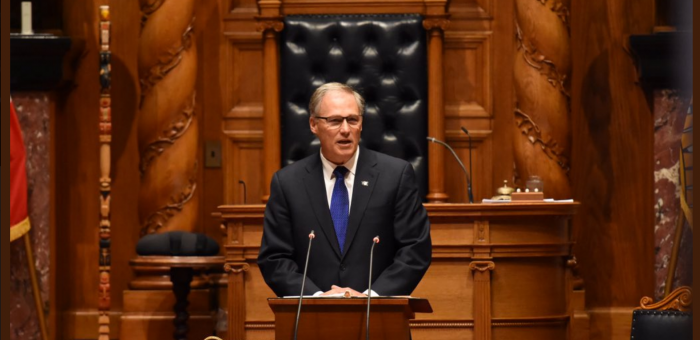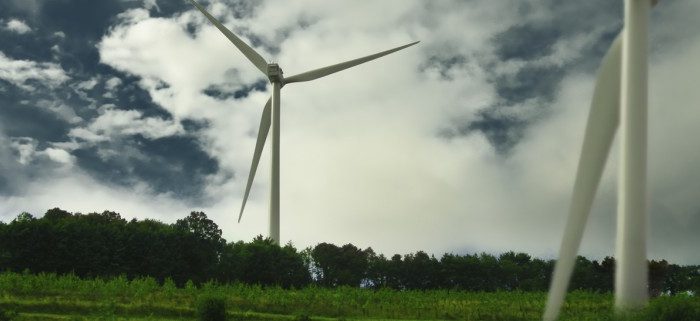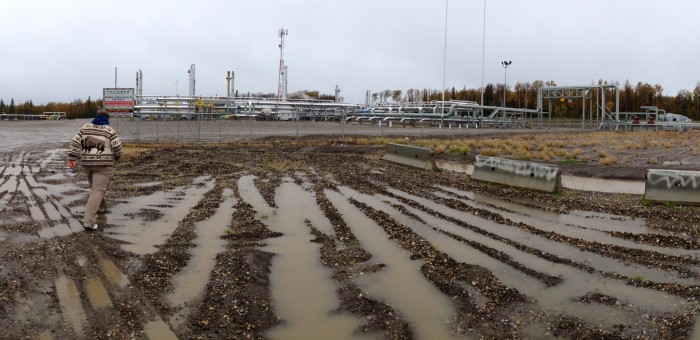Issues Blog
Bringing the warning from the world’s scientists to the BC Legislature
On November 13, 2017 a second world scientists’ warning to humanity was published in Oxford University Press’s prestigious journal Bioscience. Signed by 15,364 scientists from 184 countries, this warning concluded:
“To prevent widespread misery and catastrophic biodiversity loss, humanity must practice a more environmentally sustainable alternative to business as usual. Soon it will be too late to shift our course away from our failing trajectory, and time is running out. We must recognize in our day-to-day lives and in our governing institutions that earth, with all its life, is our only home.”
This message came 25 years after a similar message was delivered by 1,575 pre-eminent scientists in 1992.
What’s remarkable is that the support for the second warning continues to grow and it has strong support from the British Columbia scientific community. For example, of the 15,364 initial signatories, 40 were from the University of Victoria and 61 from the University of British Columbia. 554 scientists from Canada signed the initial warning and this number has grown to 994 since the letter was published.
Anyone who has watched the documentary Running on Climate knows that I take the warning very seriously. It was the reason that I ran with the BC Greens in 2013.
Today in the legislature I rose during Members’ Statements to bring the message of these scientists directly to the BC Legislature.
Below I reproduce the video and text of my delivery. I also append the accompanying media release.
Video of Statement
Text of Statement
A. Weaver: In 1992, Dr. Henry Kendall, a Nobel laureate in physics, organized a statement signed by 1,575 pre-eminent scientists that was sent to government leaders of all nations. The statement warned:
“Human beings in the natural world are on a collision course. Human activities inflict harsh and often irreversible damage on the environment and on critical resources. If not checked, many of our current practices put at serious risk the future that we may wish for human society and the plant and the animal kingdoms and may so alter the living world that it will be unable to sustain life in the manner that we know. Fundamental changes are urgent if we are to avoid the collision our present course will bring about.“
Twenty-five years later, a second warning, now signed by 15,364 scientists from 184 countries was issued. Published last week in Oxford University Press’s prestigious journal Bioscience, this warning concluded:
“To prevent widespread misery and catastrophic biodiversity loss, humanity must practice a more environmentally sustainable alternative to business as usual. Soon it will be too late to shift our course away from our failing trajectory, and time is running out. We must recognize in our day-to-day lives and in our governing institutions that earth, with all its life, is our only home.”
The warning quantitatively analyzed the nine environmental issues identified in 1992, and they show that in all cases but one, conditions have actually gotten worse and, in most cases, dramatically so.
Yet that one success story offers us so much hope. In 1987, the Montreal protocol was finalized. All 197 countries in the UN have ratified this protocol, and it has led to a dramatic reduction in substances that deplete the ozone layer. And 170 of these 197 countries have already ratified the Paris climate agreement, which formed the basis of discussions earlier this month at the 23rd Conference of the Parties to the UN framework convention on climate change.
Let us collectively reflect upon the warnings of the world’s scientists, as well as the words of the Gov. Jay Inslee, who addressed the Legislature yesterday. In reference to tackling climate change, he noted:
“This is one of the greatest challenges of our time. If we are remembered for anything 100 years from now, this is what we will be judged on. It is time for us rise to that challenge.“
Media Release
Weaver delivers warning from 15,364 scientists to the B.C. Legislature
For immediate release
November 22, 2017
VICTORIA, B.C. – Andrew Weaver, leader of the B.C. Green Party, read a warning from a letter signed by from 15,364 scientists in 184 countries to the B.C. Legislature. The Letter, published last week by the Alliance of World Scientists and entitled “World Scientists’ Warning to Humanity: a second notice,” warns world leaders that there needs to be change in order to save the earth.
“As leaders, we have a responsibility to younger generations to ensure that our actions today do not leave them worse off than we are,” said Weaver.
“I am proud to deliver this message to the B.C. legislature so that we may be reminded of this responsibility and take urgent action to address climate change. B.C. has a history of leadership in climate action. I am proud that our Agreement with the B.C. NDP has once again moved us in this direction, but there remains much work to be done.
“B.C. has a highly educated workforce, abundant natural resources and is one of the most beautiful places in the world to live. If we have the courage to champion a bold vision, we can ensure that B.C. is a leader not only in climate action, but also in the low-carbon economy that is emerging as world leaders step up to reduce emissions.”
The letter states that in order “to prevent widespread misery and catastrophic biodiversity loss, humanity must practice a more environmentally sustainable alternative to business as usual…Soon it will be too late to shift course away from our failing trajectory, and time is running out.”
The warning comes 25 years after Dr. Henry Kendall, a Nobel Laureate and former Chairperson of the Union of Concerned Scientists, organized a similar statement signed by 1,500 scientists in 1992.
Weaver is a renowned climate scientist who prior to his election in 2013 served as Canada Research Chair in climate modelling and analysis in the School of Earth and Ocean Sciences at the University of Victoria. He was a Lead Author on the 2nd, 3rd, 4th and 5th Intergovernmental Panel on Climate Change’s scientific assessments and has authored or coauthored over 200 peer-reviewed, scientific papers and was the Chief Editor of the Journal of Climate from 2005-2009.
-30-
Media contact
Jillian Oliver, Press Secretary
+1 778-650-0597 | jillian.oliver@leg.bc.ca
Washington Governor Jay Inslee addresses the BC Legislature
Washington State Governor Jay Inslee addressed the BC Legislature today. He offered an inspirational message of how Washington is positioning itself as a leader in the emerging 21st century economy, while at the same time taking steps to aggressively reduce greenhouse gas emissions. As leader of the third party, I was entitled to deliver a brief response.
Below I reproduce the text and video of my response. I also include the video of the Governor’s speech, followed by the videos of the responses by the Premier and the Leader of the Official Opposition.
Text of my response
A. Weaver: Thank you, Governor Inslee. We’re honoured to have you address the B.C. Legislature today.
My colleagues in the B.C. Green Party and I greatly appreciate your thoughtful words and, in particular, we greatly appreciate your continued climate leadership south of the border.
You know, we know how challenging and, frankly, at times frustrating it can be to work on this issue amongst those vested in the status quo, unable to recognize the economic opportunities that are presenting themselves. We commend your leadership and your perseverance on this file.
Our jurisdictions share a wealth of renewable natural resources that position us uniquely qualified to rise to the challenges climate change will bring. And we possess, as you note, the natural beauty that allows us to attract the best and brightest in the world, by offering them the greatest place in the world to live.
As governor, you’ve recognized this. By already working to attract and expand carbon fibre manufacturing at Moses Lake in rural Washington, by bringing this energy intensive manufacturing facility for BMW’s i-series electric vehicles close to the production of cheap renewable energy, Washington is capitalizing on the emerging 21st century economy. And what’s more, at the same time, you’re reducing transmission line energy loss.
Your government is illustrating that acting on climate change drives innovation, jobs and prosperity for all. With an economy that grew 2½ times the national rate last year, Washington was named the number one place in America to do business in 2017.
This was achieved while simultaneously demonstrating international leadership on the biggest challenge facing humanity.
I hope your demonstrated success reassures British Columbians, as we make bold choices of our own in the years ahead. Not only is it possible for governments to drastically reduce carbon emissions, but doing so spawns innovation, economic growth and job creation.
Finally, when reviewing your book, Apollo’s Fire: Igniting America’s Clean Energy Economy, I was reminded of president John F. Kennedy’s quote that I often use when talking about climate change.
In 1962, when President Kennedy announced that America would send a man to the moon by the end of the decade, he said this: “We must be bold.” He further said:
“We choose to go to the moon in this decade, not because it’s easy, but because it’s hard, because that goal will serve to organize and measure the best of our energies and skills, because the challenge is one that we are willing to accept, one we are unwilling to postpone, and one we intend to win.“
The time to be bold is upon us.
With that, I thank you for giving us so much to aspire to.
Governor Inslee’s address and my response
Response of Premier and Leader of Official Opposition
Contrasting the escalating costs of Site C to the diminishing costs of renewables
Today in the legislature I rose in Question Period to ask the Minister of Energy, Mines and Petroleum Resources about the escalating costs of Site C relative to the diminishing costs of renewables.
In the days ahead, the BC cabinet will make a decision on whether or not to proceed with the construction of Site C. It’s critical that cabinet make its decision based on the best available evidence. It’s clear to me that Site C is about to emerge as BC’s very own Muskrat Falls. A public inquiry in Newfoundland and Labrador will begin this January to determine why that hydro megaproject is so many billions of dollars over budget and so far behind schedule. It will also examine why the project was exempt from oversight by the Public Utilities Board much as the Site C project was approved without oversight from the British Columbia Utilities Commission.
Below I reproduce the video and text of the exchange. It is clear to me that the BC Liberals were feeling very uncomfortable with the line of questioning as their heckling was so loud and ongoing that I had to stop several times.
Video of Exchange
Question
A. Weaver: I see the members on the opposite side here are somewhat troubled about question period and are a little feisty today.
I’d like to take us back, hon. Speaker. I’d like to take us back to the previous decade, when Site C was advanced to stage 3 of the approval process. Its price tag then was somewhere between $5 billion and $6.6 billion. Let’s now fast-forward to 2011. The price tag now was $7.9 billion. Two years later, now in 2013, the price tag was $8.3 billion. Then the price tag grew to $8.9 billion, accompanying a year-long delay in the construction schedule.
Now the B.C. Utilities Commission says this directly: “Given the nature of this type of project and what has occurred to date, total cost for the project may be in excess of $10 billion, and there are significant risks that could lead to further budget overruns.” The cost, they found, could end up being $12 billion — and this only two years into a nine-year project.
Interjections.
Mr. Speaker: Members.
A. Weaver: My question through you, hon. Speaker — if I’m allowed to actually ask it over the heckling from opposite — is this. It’s to the Minister of Energy, Mines and Petroleum Resources. Will the minister stop the Site C project…?
Interjections.
Mr. Speaker: Members.
The question, please.
A. Weaver: I’ll try again.
Will the minister stop Site C before it gets any worse and protect British Columbians from a project that already shows signs of having costs that will spiral completely out of control?
Answer
Hon. M. Mungall: Thank you to the member for the question. I find the question very interesting because I think it highlights exactly why this project should have gone to the B.C. Utilities Commission right from the very get-go. The fact that the official opposition, when they were in government, chose not to do that — I’ve said it before, and let me say it again — was the wrong choice.
This government has righted that wrong. We have finally gone to the B.C. Utilities Commission, and we were able to get answers to the questions that British Columbians had, questions that I’m sure that the Leader of the Third Party had as well. This government is taking all of that information into consideration as we deliberate on this very important issue for British Columbians, and we’ll be working and making a decision in the best interests of British Columbians.
Supplementary Question
A. Weaver: Thank you to the minister for the response. In contrast to the grim picture of ballooning Site C construction costs, let’s now take a look at the renewable energy sector. Wind, solar and geothermal power have become cheaper and scaled up faster than anyone predicted. The cost of wind power has decreased by 90 percent since the 1980s. In the last eight years alone….
Interjections.
A. Weaver: I know that members opposite don’t like to hear data, but if you could let me actually get it through, we’d be actually all benefiting from this.
In the last eight years alone, costs for wind power declined by 66 percent. And the costs are predicted to continue to fall. Bloomberg, for example, predicts that onshore wind costs will fall by 47 percent by 2040 and offshore costs will fall by 71 percent.
Now I get that they’re feisty opposite, hon. Speaker, because they don’t like the real data. They’re just living in an ideological world of mysterious data.
Solar energy tells a similar story.
Mr. Speaker: Member, the question, please.
A. Weaver: Thanks. If I could actually ask the question….
Solar energy tells a similar story. Costs have decreased by 68 percent since 2009, and they’re projected to decrease by a further 27 percent in the next five years. We have a window of opportunity now to harness renewables and build power that puts us on the cutting edge of innovation and provides local jobs and benefits.
Mr. Speaker: Member, the question please.
A. Weaver: My question — if I can get it above this background of raucous Liberal members — to the Minister of Energy, Mines and Petroleum Resources, is this: are you prepared to forgo this generational opportunity to harness renewables by continuing in the B.C. Liberal footsteps with building a doomed megaproject?
Answer
Hon. M. Mungall: It’s clear that members opposite sure are feisty today. I’m glad that the member did get his question in.
He will note that part of my mandate letter is to build that road map into the future in terms of B.C.’s energy policy, looking specifically at our opportunities — our tremendous opportunities — at renewables.
But for today, we have to address this issue of Site C. No decision has been made, but we are in the decision-making process, and we take it very seriously. This is a very important decision for British Columbians well into the future, and that’s why we have ensured that we’re doing our due diligence by starting with the B.C. Utilities Commission.
We’re looking at the information that they brought forward as well as the incredible amount of information that has come out over the years about Site C, and we will be making a decision that works for British Columbians today and into future generations.
The ongoing subsidy of natural gas extraction in BC
Today in the legislature I rose during budget estimate debates for the Ministry of Energy, Mines and Petroleum Resources to ask a number of questions concerning the natural gas industry in British Columbia. My questions were designed to explore whether or not the BC Government was going to continue giving away our natural resources.
As I have mentioned numerous times over the past few years, the BC Liberals were so desperate to try and land an LNG industry in British Columbia that they literally gave the resource away. This giveaway is embodied in a number of Acts that they passed including Bill 30 — Liquefied Natural Gas Project Agreements Act, 2015 and Bill 19: Greenhouse Gas Industrial Reporting and Control Amendment Act, 2016.
My first two questions were designed to see whether or not the BC Government would pull the plug on the agreement with Progress Energy and its partners which was predicated on Petronas making a positive final investment decision by June 2017. Petronas decided to walk away from the project in July 2017.
The remainder of the questions were designed to contrast the BC taxpayer subsidy to the natural gas industry as embodied in the “deep-well tax credits” with royalties that the province receives from the natural gas sector. As you will see in the discussion below, the province makes virtually no money on natural gas royalties. And we have an accumulated $3.2 billion dollar tax credit subsidy on the books for this industry.
Below I reproduce both the text and video of the exchange. I am sure you will be shocked by what you read.
Text of Exchange
A. Weaver: I have a number of questions on this subject matter. First off, I am troubled by some of the direction this conversation is going. We’re still trying to double down on the economy of the last century, while the rest of the world is moving forward. But with that said, let me ask a couple of issues with respect to the royalties that we’ll get.
The first is this. We know that the previous government made a deal with Progress Energy and its partners that would have locked in royalty rates, low rates, for years and would have cost British Columbians millions in lost revenue. One of the key conditions of the deal, however, was that Petronas had to make a final investment decision on Pacific Northwest LNG by June of 2017, and Petronas decided to kill that project in July of this year.
Our government now has the legal right to terminate this backroom deal, this bad backroom deal, which literally gave away our resource. My question to the minister is: can the minister tell us if the long-term royalty agreement with Progress Energy will be terminated?
Hon. M. Mungall: Thank you to the member for the question. I appreciate that he’s done his homework and he’s looked at the details of this particular project. What I can tell him right now is that the ministry has started looking into it and started to look at some of the legal aspects around that. We’ll be able to have a better idea later on. Apologies for not being able to have a more fulsome answer for him today.
A. Weaver: Can the minister let the House know if any other long-term royalty agreements are being negotiated with other oil and gas companies in line with using the Progress Energy agreement as the bar by which others will be judged?
Hon. M. Mungall: There’s nothing of that kind at this time.
A. Weaver: If we move now to the deep-well royalty program — a program that has, in my view, surpassed its usefulness, but we’ll come to that…. This deep-well royalty program was designed to enable the provincial government to share the costs of drilling in B.C.’s deep gas basins. It has since transformed into a massive subsidy for horizontal drilling and hydraulic fracturing.
It is my understanding that natural gas companies now receive hundreds of millions of dollars in “deep-well credits,” even for shallow wells, provided their horizontal sections are long enough. So five questions on this topic. One is: can the minister please tell the House what the amassed or outstanding value of these deep-well credits currently is?
Hon. M. Mungall: We’re getting that value of outstanding credits for the member. We don’t have it. We’re trying to find it in these big binders, so we’re getting that for him.
I just wanted to point out that in terms of how the program works…. I’m sorry if I missed it — perhaps the member already mentioned and he knows. What it is, is it’s credits against royalties owing. So it’s not money going to government. It’s just that we’re collecting less royalties based on a credit program that looks to incentivize industry for doing a particular task that government is hoping it will do.
A. Weaver: Very specifically, then: what is the value of the deep-well credits that were redeemed in 2016-2017?
Hon. M. Mungall: I’ll have to get back to the member on that as soon as possible. We’re just grabbing that for him.
A. Weaver: At the same time, I’d like to get the information as to what was the value of the royalties that the province of British Columbia earned from exploration in 2016 and 2017? And then I’d like to have the difference of those two numbers as well.
Hon. M. Mungall: We do have the first number for the member, and it’s the total of accumulated deep credits at $3.2 billion. That’s the total accumulation of all credits. Those credits are only available, however, to any company if their well is producing. So, if their well isn’t producing — say they earned credits as they did their exploration phase, but they didn’t produce the well — then they wouldn’t be able to access those royalty credits.
A. Weaver: The point I’m trying to get at here — and I really need the second part of those numbers — is that the credits that we give exploration companies from this deep-well program, these deep-well credits, essentially preclude us earning any money on royalties from the natural gas that is extracted.
Why it’s critical that we get the actual amount of money that we made from royalties for natural gas in 2016-2017 is we only have a cumulative total — $3.2 billion — that is yet to be claimed in the credit program. But we need to know the numbers based on an annual credit-versus-royalty gain to tell British Columbians how much we are actually making from our resource.
The reason why I think this is important — and I hope we can get these numbers before estimates end today — is that, frankly, I have no idea why this program is still needed. Why do we still need to have this deep-well credit program in light of the fact that horizontal fracturing is no longer a new technology? In fact, it’s in use all around the world. We had deep-well vertical fracturing, which my friend from Peace River South was referring to earlier, that went back decades.
Horizontal fracturing is not new. We don’t need those credits. So why do we continue to have this program? Because all that this ensures is that we earn nothing from our natural resource here in British Columbia.
Hon. M. Mungall: I’m going to make sure that we get all the correct numbers to the member opposite as soon as we possibly can, and if we’re not able to do that today for some odd reason, I’ll be sure to get it to him in the very near future.
On that, I appreciate his points. I think they’re fair points. I’ll take that into consideration.
A. Weaver: I was so dutifully notified that I was speaking at this microphone over here, where I should be speaking to my…. I’m standing at my desk, but the microphone was not pointed correctly. Corrected now.
The final question on this topic is: does the minister plan to continue this subsidy program? You know, we’ve talked about subsidies to the oil and gas industry in this province. This is a gigantic giveaway. It ensures that we essentially make no money from royalties because of the magnitude of the credit program that it can be claimed against.
In fact, my understanding is we’ve received virtually zero in 2016-2017 in natural gas royalties because of the deep-well credits that were claimed against those royalties. So will the minister continue this subsidy program?
Hon. M. Mungall: I’m terribly sorry. To the member, I didn’t catch the actual question because I got those numbers for him.
The total credits that were earned in 2016-2017 was $229 million, and the net of all royalty credits was $145 million. So we took in $145 million as government, in 2016-2017.
A. Weaver: And we gave away $229 million in the process. If I might add….
Interjection.
A. Weaver: Yes, because those credits were not claimed, were claimed against royalties — so that’s $229 million that could have come into our revenue here. We’re subsidizing the oil and gas sector to that amount.
Imagine this. If we actually subsidized renewable energy in British Columbia to the tune of $229 million a year, let alone the generational sellouts embodied in the Progress Energy agreement that we referred to earlier….
So my final question is: does the minister plan to continue this program, and if so, why does this industry still need a subsidy?
Hon. M. Mungall: In terms of reviewing the royalty credit program, there isn’t a plan to do so at this time.
Video of Exchange
BC Greens, BC Liberals and BC NDP work collaboratively to improve legislation
Today in the legislature the BC Government introduced a series of amendments designed to improve the Election Amendment Act, 2017. In their accompanying news release, the Attorney General, David Eby, stated:
“I am pleased that the amendments introduced today are a tangible result of that commitment and include changes proposed by both opposition parties.“
We were very pleased that the government tabled two of our proposed amendments. Below is the press release that we issued today.
Media Release
B.C. Greens work with government to increase transparency, reduce influence of big money in new campaign finance legislation
For immediate release
November 20, 2017
VICTORIA, B.C. – Andrew Weaver, leader of the B.C. Green Party, and Adam Olsen, Party spokesperson for campaign finance, welcomed the introduction of a number of amendments to the Elections Amendment Act today. Two amendments, one to phase in quarterly reporting and another to limit the influence of big money currently in the system, were ideas that the B.C. Greens brought to the table during their consultations with the government following the introduction of the legislation earlier this year.
“Big money has been a notorious defining feature for B.C. politics, and it is remarkable how far we have come since the election,” said Weaver.
“We have now achieved all-party agreement on the need to reform our campaign finance laws. All parties have brought different ideas to the table as to the shape this should take, and today we have a number of amendments that reflect the views of all three parties. This is exactly how government should work and I am deeply encouraged by the emerging instances of collaboration in this minority government.”
Olsen added that the amendments greatly strengthen the transparency and integrity of the legislation.
“We felt that quarterly reporting for political donations, which is already required federally, was an essential feature for ensuring transparency in our campaign finance system,” said Olsen.
“Quarterly reporting will give the press and the public a much more clear and timely picture of the flow of political donations in this province, which will go a long way towards increasing accountability and trust.
“The prior political contributions amendment will ensure that the big money donations currently in the system cannot directly influence voters and pay for political attack ads. This will greatly expedite the transition to a campaign finance system where people, not special interests, are what drive our politics in British Columbia.”
-30-
Media contact
Jillian Oliver, Press Secretary
+1 778-650-0597 | jillian.oliver@leg.bc.ca








